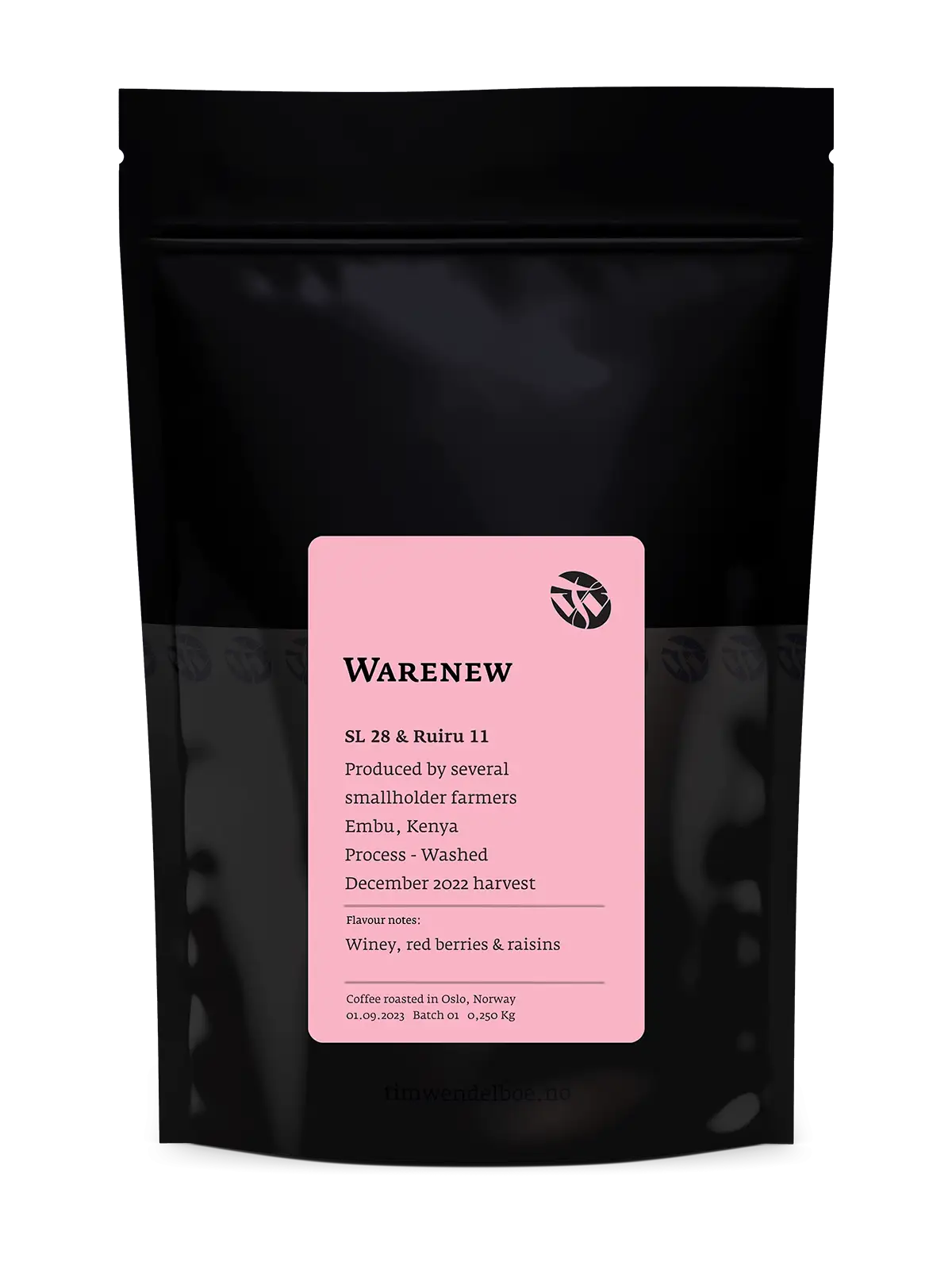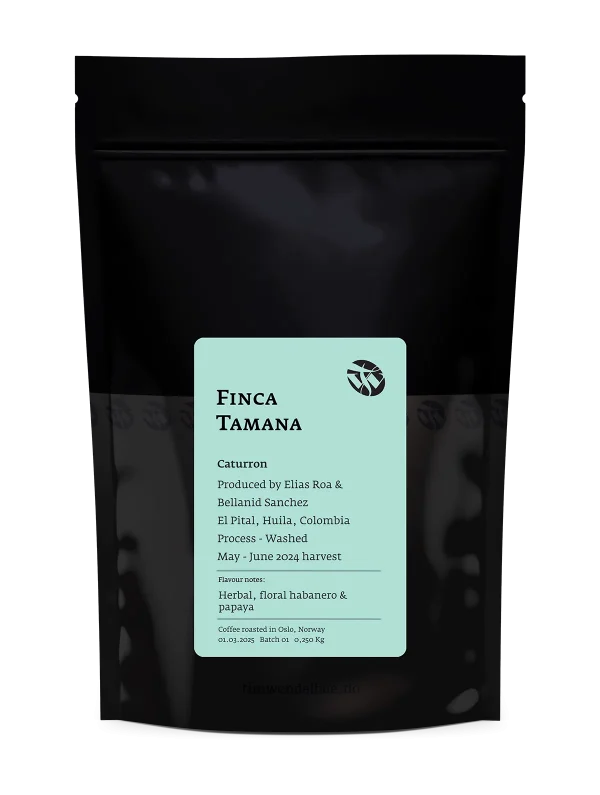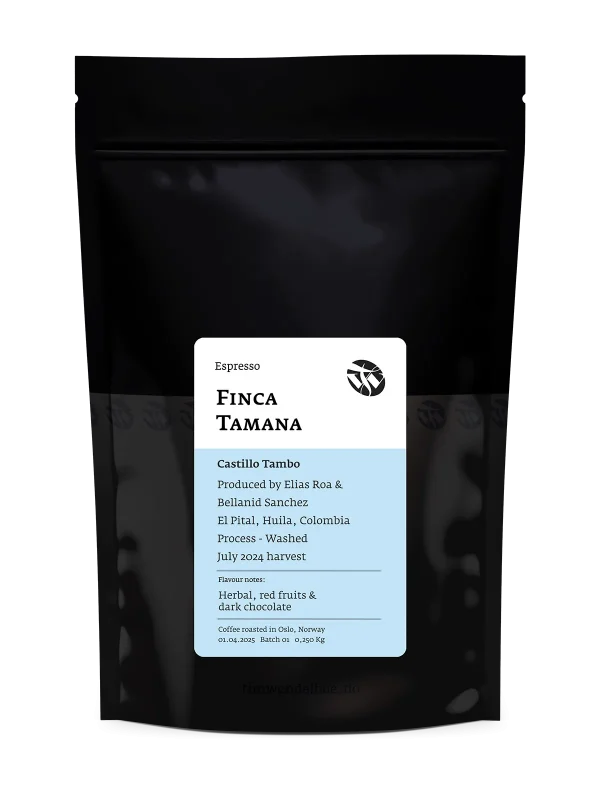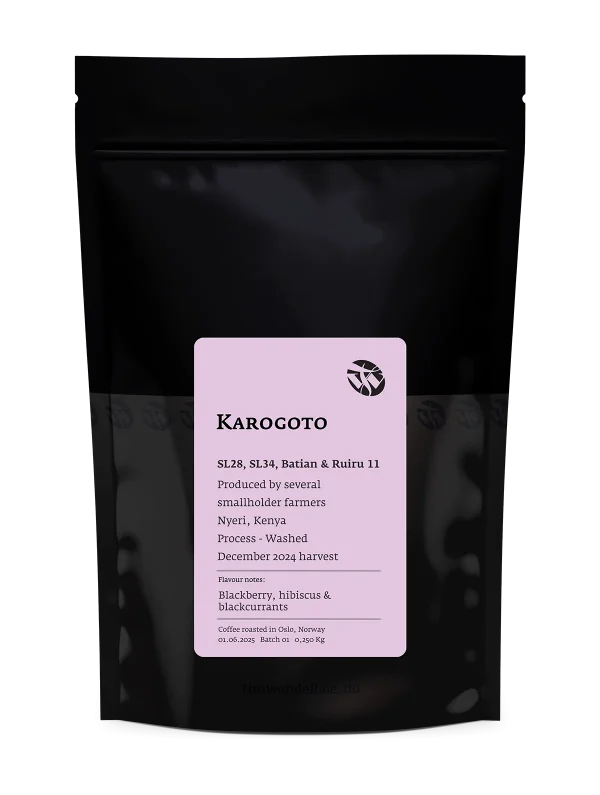| Cultivar | SL28 & Ruiru 11 |
|---|---|
| Flavour Notes | Winey, red berries & raisins |
| Producer | Several smallholders farmers |
| Country | Kenya |
| Region | Embu |
| Process | Washed |
| Harvest | December 2022 |
| Roast Profile | Light Roast |
| Bag Size | 250g |
| Contents | Whole Coffee Beans |
Warenew
kr205.00
An intense and refreshing Kenyan coffee with winey red fruit and purple berry flavours.
Out of stock
Additional information
Tim's Notes
Warenew is a company founded by a group of farmers who decided to start working together towards a common goal of increasing their production, value and quality of their coffee.
The farms are all located around Embu, in altitudes ranging from 1300 - 1800 meters above sea level. The members / farmers are mainly growing the SL28 cultivar that is famous for its fruity high quality cup profile, yet some of the farms located in the lower parts are also growing Ruiru 11 as it is tolerant to leaf rust and resistant to coffee berry disease, the two fungal diseases that are very common on coffee trees in Kenya.
The 2022/23 harvest is the best we have ever tasted from Warenew. The coffee is more intense and fruity than in previous years where it has been slightly more herbal, especially in the aftertaste. My impression in general is that the 2022/23 harvest in Kenya was the best in several years and buying coffees in Kenya this year was a real treat due to the overall high quality of the coffees.
Fun fact: It was during a visit to some of their members farms where I learned the planting technique that has been a huge success at our own biological coffee farm in Colombia, Finca el Suelo.
The farms are all located around Embu, in altitudes ranging from 1300 - 1800 meters above sea level. The members / farmers are mainly growing the SL28 cultivar that is famous for its fruity high quality cup profile, yet some of the farms located in the lower parts are also growing Ruiru 11 as it is tolerant to leaf rust and resistant to coffee berry disease, the two fungal diseases that are very common on coffee trees in Kenya.
The 2022/23 harvest is the best we have ever tasted from Warenew. The coffee is more intense and fruity than in previous years where it has been slightly more herbal, especially in the aftertaste. My impression in general is that the 2022/23 harvest in Kenya was the best in several years and buying coffees in Kenya this year was a real treat due to the overall high quality of the coffees.
Fun fact: It was during a visit to some of their members farms where I learned the planting technique that has been a huge success at our own biological coffee farm in Colombia, Finca el Suelo.
Cultivar
Process
Picking and sorting
- The coffee cherries are typically hand picked by the farmers and their family members. After delivering the coffee cherries to the wet mill the cherries are bulked together for processing.
- The cherries are de-pulped and the parchment coffee, with it’s mucilage still on, is moved directly to the fermentation tanks where it is dry fermented for about 12-16 hours over night. After fermentation the coffee is washed in clean water and graded in a traditional washing channel by gravity. The more dense beans are dried separately from the beans with lower density and inferior quality.
- The coffees are dried on elevated drying tables, where defect parchment coffee gets sorted out by hand. Drying the coffee takes about 10–14 days. During daytime the coffees are raked to ensure even drying. The drying tables are covered during the hottest times of the day to avoid over heating and also at night time to prevent condensation. The drying process is finished when the moisture content in the coffee beans is between 10-12%. After drying, the coffees are stored in conditioning bins before delivery to the dry mill. The coffees we buy from Kenya are always vacuum packed before it is shipped to Norway.
Shipping
For our Norwegian customers, we offer three shipping options:
- Pakke i Postkassen - With Pakke i Postkassen, tracking is provided, and delivery is estimated within 2-3 business days.
- Pakke til hentested - The parcel can be collected from a Post in Store, Post Office, parcel locker, or parcel box. This option includes tracking, with delivery expected within 1-5 business days.
- Norwegian Post, No Tracking (Brevpost) - This option does not offer tracking. Delivery is estimated within 2-5 business days.
How To Brew
Filter
- We strongly recommend using the correct measurements and brewing techniques when you brew our coffees. Use a digital scale both to measure water and coffee in order to get consistent results, and we recommend using between 60 to 70 grams of coffee per litre (1000g) of water, depending on the brewing method, water quality and coffee used.
- We strongly recommend using VST filter baskets. Both the 18g, 20g and the 22g basket is great for our coffee. The VST filters makes it a lot easier to extract the espresso properly which gives a lot more sweetness in the cup. They are also more or less identical to each other which makes it easy to be more consistent when brewing on several groups at the same time. You can buy the filters on our webshop, just make sure they fit your machine (ours fits all La Marzocco machines and machines with 58mm filter baskets). With the VST 18g filter basket, we recommend the following brewing parameters: 18-19g freshly-ground coffee, 25-35s brewing time, 35-38g of final brew liquid in the cup, 93°C-94°C brew water temperature.




